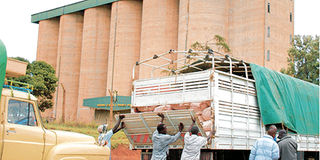Leaders’ cartel blamed for maize shortage

Workers prepare to offload maize delivered to the National Cereals and Produce Board depot in Eldoret on Monday. Leaders have been linked to a cartel that has been blamed for the artificial shortage of maize, which has led to a sharp rise in the cost of maize flour. Photo/JARED NYATAYA
What you need to know:
Politicians have made millions of shillings from dubious deals with cereals board
A racket involving senior politicians and businessmen has been blamed for the artificial shortage of maize and maize flour that has hit many parts of the country.
Investigations by the Nation indicate that the politicians have been buying maize from the cereals board and selling it to millers at exorbitant prices.
Letters from the Ministry of Agriculture are being used by the cartel to authorise the purchase of maize from the National Cereals and Produce Board. The cartel later resells the maize to millers at a higher price.
The shortage of maize has seen the price of the staple maize meal shoot from an average Sh85 a week ago to Sh120 for the two-kg packet.
Dubious deals
Sources have revealed that those in the cartel, including a number of MPs, have made millions of shillings from the dubious deals.
On Monday, Prime Minister Raila Odinga held a crisis meeting with a Cabinet sub-committee on food security where they decided that middlemen be pushed out of the maize business.
Fears are also emerging that the cartel has been engaging in similar dealings for sugar and fertiliser, whose prices have been on the increase since the beginning of the year.
The politicians and businessmen are said to be buying a 90-kg bag of maize at Sh1,700 and selling it to the millers at between Sh2,200 and Sh2,700.
It is, however, believed that the politicians are not using their money in the shady deals. Instead, they have been acting as brokers.
According to one reliable source, several associates of the politicians showed up three weeks ago at the cereals board depots with letters authorising them to buy 25,000 bags of maize each.
After the dubious deal, each of the politicians earned between Sh12.5 million and Sh25 million depending on the price at which they sold the maize.
The price of maize flour has shot up by up to 50 per cent in the recent past to retail at Sh120. Millers have warned of an acute shortage of the product that was selling at between Sh80 and Sh85 only a week ago.
The millers have blamed the shortage on lack of maize in the market.
The shortage led to a crisis meeting of trustees of the National Cereals and Produce Board that was chaired by Special Programmes PS Ali Mohammed.
The meeting, according to the PS, came after the media reported a sharp rise in the cost of maize flour.
National Cereals Board managing director Gideon Misoi, Finance permanent secretary Joseph Kinyua and his Agriculture counterpart, Mr Romano Kiome, attended the meeting.
According to Mr Mohammed, the meeting was meant to find out how the Government could intervene to end the shortage.
The permanent secretaries later attended a meeting by the Cabinet subcommittee of food security, which is chaired by Mr Odinga.
Besides stocking up supplies for the national strategic food reserve, the board is authorised to sell maize commercially, but was stopped from doing so by the ministries of Agriculture, Special Programmes and Finance.
Meanwhile, for the second day, some supermarkets in Nairobi went without maize flour. Retail outlets that had the commodity were selling it for between Sh98 and Sh122.
“I cannot survive without ugali,” said Mrs Mary Otieno, a customer.
Although some supermarkets had the Soko brand of flour, others like Jogoo and Ugali were out of stock.
At the Ukwala store on Tom Mboya Street, there was a polite notice asking customers to only pick two packets of flour each.
Nairobi lawyer Paul Muite said that millers have been barred from buying maize directly from the cereals board by a cartel that has “been reaping profits as the common mwanachi continues to suffer”.
“The board is only selling the maize to a clique of businessmen at Sh1,600 only to sell later to millers at Sh2,600 making obscene profit at the expense of the mwanachi,” Mr Muite told the Nation on phone.
According to him, this was the worst form of corruption considering that millions of Kenyans live in poverty.
On Sunday, Mr Ruto said the maize shortage was artificial and blamed millers whom he accused of refusing to buy maize directly from farmers.
However, Kenya Association of Manufacturers chairman Vimal Shah said there was no maize in the market.
Meanwhile, the NGO Council — which brings together all NGOs in the country — has urged the Government to step in to control the surging food prices.
Council chairman George Wainaina said a small group of people were out to rip off Kenyans.
He said most parts of Western and Rift Valley provinces had recorded impressive harvests of maize and that farmers in those areas were selling the grain at throwaway prices while major towns where recording a shortage of maize flour.
“Unga will be the last thing to be reported scarce in Kenya... Something is amiss here. They should tell us what is happening,” he said.
Additional reporting by Casper Waithaka and Kibiwott Koross




